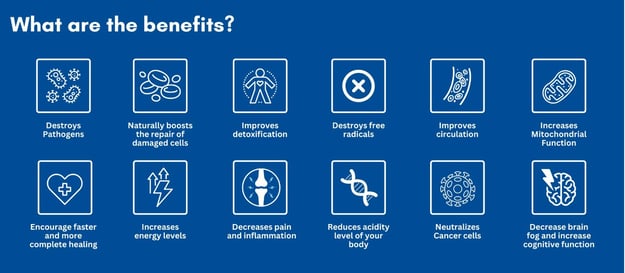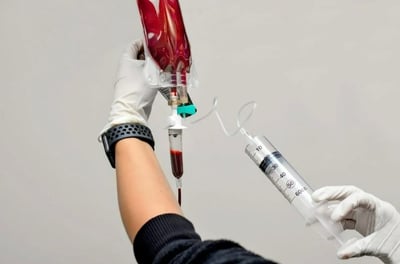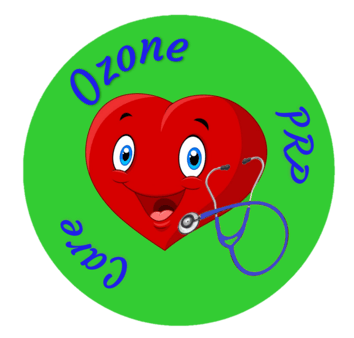Ozone Therapy
What is Ozone Therapy?
Ozone Major Autohemotherapy is a therapeutic procedure in which ozone gas (a form of oxygen) is administered to a patient's blood, which is then reinfused. The process involves drawing a certain volume of blood from the patient, mixing it with ozone in a sterile environment, and subsequently reinfusing the ozonated blood into the patient. This treatment is primarily used to enhance the body’s natural healing processes.
How It Works?
1. Blood Collection: A small amount of blood is drawn from the patient.
2. Ozone Introduction: The collected blood is mixed with medical-grade ozone in a controlled environment.
3. Reinfusion: The ozonated blood is infused back into the bloodstream.
Benefits of Ozone Major Autohemotherapy
1. Boosts Immune System: Ozone therapy stimulates the immune response, helping the body fight infections more effectively.
2. Improves Blood Circulation: Ozone can enhance oxygen delivery to tissues, increasing overall metabolic performance and reducing fatigue.
3. Detoxification: The process may help in detoxifying the body by breaking down toxins and improving liver function.
4. Antimicrobial Effect: Ozone is known for its antimicrobial properties, making it effective against bacteria, viruses, and fungi.
5. Pain Relief: Patients have reported reduced pain associated with various conditions, including arthritis and chronic pain syndromes.
6. Enhanced Healing: Ozone therapy may accelerate the healing of wounds and injuries by promoting tissue regeneration and reducing inflammation.
7. Improved Energy Levels: Many patients experience increased energy and vitality following treatment.
8. Supplement to Other Therapies: Ozone therapy can be used alongside conventional treatment protocols for various health issues, enhancing their effectiveness.
Indications for Use
Ozone Major Autohemotherapy may be beneficial for:
- Chronic infections
- Autoimmune disorders
- Chronic fatigue syndrome
- Degenerative joint diseases
- Cardiac conditions
- Chronic respiratory diseases
- Skin disorders
Safety and Considerations
- Ozone therapy is generally considered safe when administered by qualified professionals.
- Potential side effects may include temporary discomfort at the injection site or minor flu-like symptoms.
- A consult with Dr. Hua is required to determine if ozone major autohemotherapy is appropriate for your specific health needs.
- An ozone lab Panel is ordered for anyone who plans to undergo ozone therapy. More comprehensive labs are available; ask us about different options.
-Vitals will be checked before and after the treatment to monitor patients for side effects.
What’s Included in the Ozone Panel?
TSH (Thyroid-Stimulating Hormone) – Evaluates thyroid function, which plays a role in metabolism and energy levels.
CBC with Differential – Assesses overall blood health, including red and white blood cell levels.
Comprehensive Metabolic Panel (CMP) – Measures kidney function, electrolyte balance, and metabolic health.
Hemoglobin A1C – Provides insight into long-term blood sugar levels and metabolic function.
G6PD Test – Required before ozone therapy to check for G6PD deficiency, which can increase the risk of complications.
Contraindications:
Absolute Contraindications:
Pregnancy: The potential risks to the fetus are unknown, so ozone therapy is generally not recommended.
Favism (G-6PD Deficiency): Ozone therapy can cause oxidative stress, which can be particularly harmful in individuals with G-6PD deficiency, potentially leading to hemolytic anemia.
Hyperthyroidism: Ozone therapy may worsen hyperthyroidism symptoms.
Recent Myocardial Infarction: Ozone therapy can increase oxidative stress, which could be detrimental in the immediate aftermath of a heart attack.
Active Hemorrhage or Hemorrhagic Tendency: Ozone therapy can potentially interfere with normal blood clotting mechanisms and exacerbate bleeding.
Intoxication (Alcohol or Drugs): Ozone therapy should not be used when intoxicated.
Ozone Allergy: Individuals with a known ozone allergy should avoid ozone therapy.
Sickle Cell Anaemia: Ozone therapy may increase oxidative stress, which can be harmful in sickle cell disease.
Iron overload: Increase oxidative stress
Relative Contraindications:
Poorly Controlled Diabetes: Ozone therapy may affect blood sugar levels, potentially making them harder to manage.
Blood Clotting Disorders: Conditions like hemophilia or those taking anticoagulants may require careful consideration due to the risk of increased bleeding.
Anemia: Ozone therapy might not be suitable for individuals with severe anemia.
Uncontrolled Seizure Disorders: Ozone therapy might trigger or worsen seizure activity.
Mental Illness in Acute Stage: The potential effects of ozone therapy on individuals with acute mental illness are not well understood.
Thrombocytopenia: Individuals with low platelet counts should be evaluated carefully before ozone therapy, as it could increase the risk of bleeding.
Severe Cardiovascular Instability: Ozone therapy might exacerbate cardiovascular instability
Uncontrolled high or low blood pressure: fluids shift can affect the blood pressure
Ask us about Ozone Packages!




